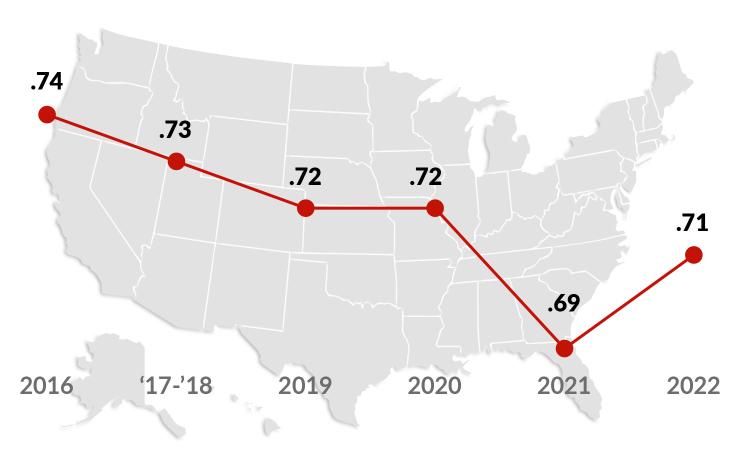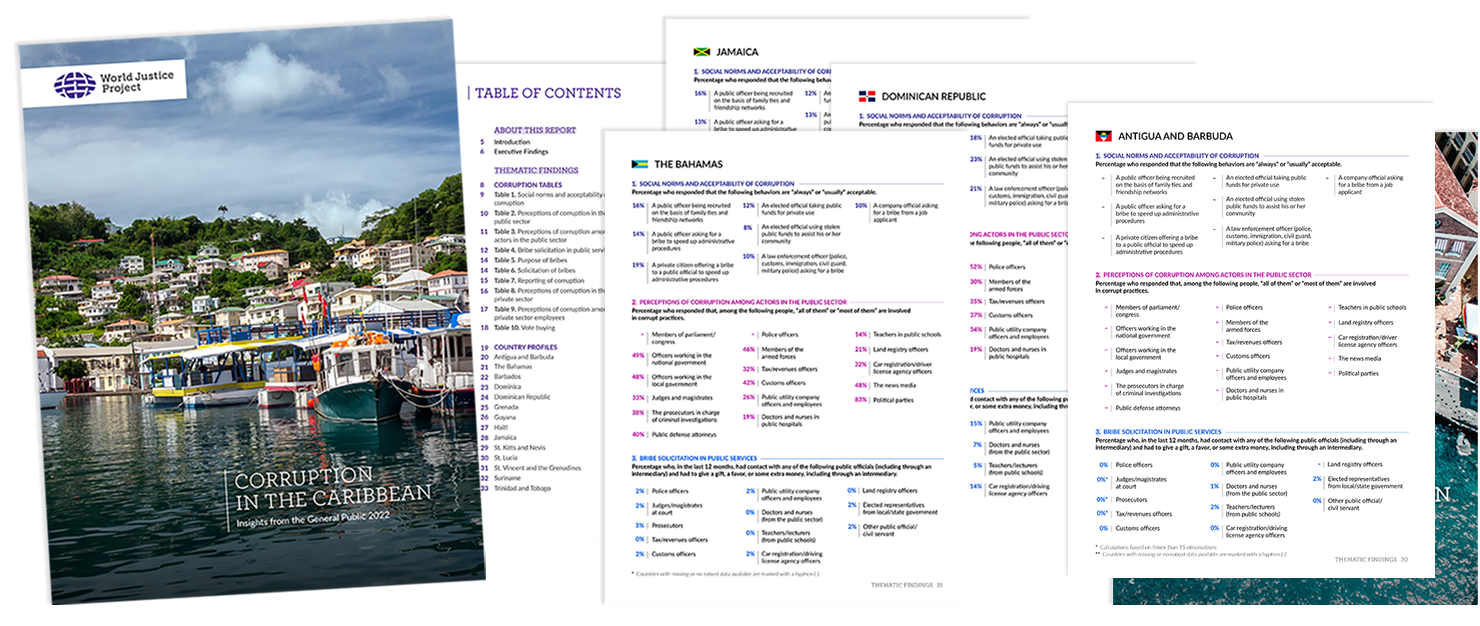


FOR IMMEDIATE RELEASE
MEDIA CONTACT: [email protected]
WASHINGTON April 20, 2023 – A majority of people in the Caribbean believe public officials are corrupt, according to findings from the World Justice Project’s Corruption in the Caribbean report. Drawing on nationally representative surveys, the report represents the voices of people in 14 Caribbean countries and their experiences and perceptions of corruption in both the public and private sectors.
On average, 80% of respondents in Caribbean countries believe that public officials frequently award government contracts to friends or relatives, and 66% believe public officials regularly request bribes.
Additionally, 74% of people, on average, believe politicians frequently use public resources to benefit their own family.
_0.png)
“When perceptions of corruption are pervasive, public trust in government institutions is undermined, and the rule of law is weakened,” said Elizabeth Andersen, executive director of the World Justice Project.
“Corruption compromises the flow of resources to support public safety, health, and education and denies people fair access to opportunities,” she added. “Combatting corruption is an important objective for governments, the private sector, and civil society organizations around the world.”
The findings in the Corruption in the Caribbean report expand upon data contained in the 2022 World Justice Project Rule of Law Index, which measures absence of corruption as a key rule of law factor for 140 countries around the world. The Index relies on nationally representative household polls and expert surveys. The new Caribbean report publishes additional insights drawn from the household polls in Antigua and Barbuda, The Bahamas, Barbados, Dominica, Dominican Republic, Grenada, Guyana, Haiti, Jamaica, St. Kitts and Nevis, St. Lucia, St. Vincent and the Grenadines, Suriname, and Trinidad and Tobago.
Bribery
The Corruption in the Caribbean report specifically probes the prevalence of bribery in the region. While the perception of corruption in the public sector was high in the countries surveyed, an average of only 7% of people who had recent contact with public officials reported they were asked to give a bribe, favor, or additional sum of money. The most frequent cases of bribery came during interactions with car registration/driver’s license officers (9%, on average, among the countries studied) and police officers (8%). The least frequent involved local politicians (2%), doctors and nurses in public hospitals (2%), and public school teachers (3%).
People in Antigua and Barbuda along with Grenada reported the lowest percentage of experiences with public sector bribery, at less than 1%, while 19% of respondents in the Dominican Republic and Haiti reported having to provide a bribe, gift, or favor within the last 12 months. Jamaica (17%) and Guyana (16%) also had similar rates of public sector bribery.
Findings from the new report show that bribery victimization within the private sector is uncommon in the Caribbean. The exception to this is Guyana. The data show that of the 39% of Guyanese respondents who had contact with the private sector in the last 12 months, 18% paid a bribe. The only other countries reporting private sector victimization rates above 5% were Haiti (8%) and the Dominican Republic (7%). The average rate of private sector bribery victimization across the Caribbean is 3%.
Nepotism and Vote Buying
The perception of nepotism, hiring, and career advancement of friends and relatives, in both the public and private sector was widespread throughout the Caribbean. On average, 81% of those surveyed believe public officials practice nepotism; 83% believe politicians and elected representatives do so.
The numbers are slightly lower for the private sector, where 75% of respondents believe private sector employees frequently or very frequently exercise influence over the hiring of friends and relatives.
The countries where perceptions of private sector nepotism are most pronounced are Trinidad and Tobago (82%), Grenada (84%), and St. Lucia (77%).
Other key findings from the Corruption in the Caribbean report concern elections. On average, 63% of people in Caribbean countries believe politicians are engaged in electoral fraud or manipulation. The report also shows how some people in the region have experienced this personally.
On average across the Caribbean, 11% of people reported attempts to manipulate their vote in national elections, and 8% in municipal elections. Respondents in the Dominican Republic and Guyana reported the highest rates of vote buying, while respondents in Antiqua and Barbuda, Barbados, and Grenada reported the lowest rates. In the Dominican Republic, 36% of those surveyed said they were asked to vote for a candidate or political party in exchange for a favor, money or goods in national elections.